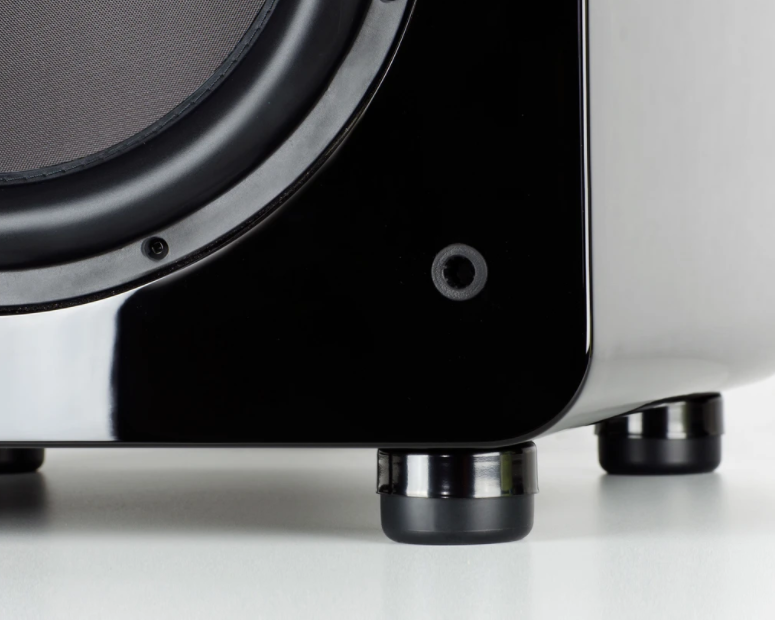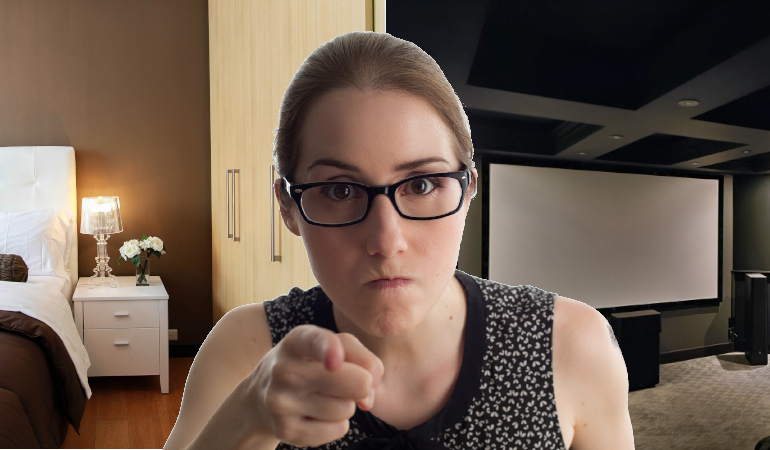Home Theater, Neighbors, and Blocking Sound: What Works and What Doesn’t
We’d all love to have detached houses with enough space between us and our neighbors so that we can play our systems as loud as we want. For some of us, that might be a few feet. For others, we need many acres of land. If you are like me, at one point or another, you’ve lived with neighbors just a single wall away. Maybe in an apartment complex, maybe in a condo. But that shared wall (or ceiling or floor) is always a point of contention. Add wanting a decent home theater to the mix, and your neighbor woes can get to litigious levels.
If you are coming here looking for soundproofing solutions, there aren’t any. There are no amount of room treatments, absorption panels, or other devices that will keep the sound from going through that wall completely. To truly soundproof that wall, you’d need to build a completely new room within your existing room. If that sounds expensive, that’s because it is. You would also certainly lose your security deposit. You don’t want to do that, but you do want to have a home theater. At the same time, you don’t want your neighbors calling the cops every time you turn it on. So, is there anything you can do? Yes!
What Works
You’ve probably already done this, but it bears repeating. The more distance and walls you can put between your home theater and your common wall, the better. Assuming you’ve done that, here are the things you can do that actually work.
1) Decouple Your Subwoofer – Most Effective!
The first thing you can do is to decouple your subwoofer(s). While we always recommend decoupling your subs, it is vitally important here. As the driver in the sub moves in and out, it creates vibrations in the cabinet. Those vibrations will travel through the feet of the cabinet and into the structure of your home. Decoupling the subwoofer (putting something squishy under it) stops this from happening. Most of what your neighbors will be hearing from your home theater will be bass. A lot of that will come from direct transmission into the structure. Decoupling is vitally important.
In the same vein, you should decouple all your other speakers as well. They can also transmit sound directly into your home’s structure.

2) Adjusting Subwoofer Volume
It doesn’t take a lot to keep the treble and midrange from passing through a wall. But bass tends to travel much more easily. You could, in theory, just turn down your subwoofers at night (or whenever you are most likely to disturb your neighbors).
Some AV receivers have special “night” modes. These function in multiple ways depending on the model of AV receiver you own. Many will bump up the vocals so that you can still understand what is being said when you lower the volume.

If you have a Denon or Marantz, you may have access to Audyssey’s LFC feature. LFC stands for Low Frequency Containment. In essence, it turns off the lowest notes on your subwoofer. You’ll still hear bass because of the upper harmonics, but the lowest notes will be gone. This should keep much of the bass from traveling through your common wall.
Lastly, and we hate to suggest this, but your subwoofers have power switches. Powering them off at night will likely solve most of your sound transmission issues. Man, that made us feel dirty just suggesting that. Ugh.
3) Talk With Them
I’ve lived next to some crazy people, so I understand if you think this isn’t an option. But, in many cases, talking with your neighbors about your home theater can make a world of difference. You’ll want to implement as many strategies as you can to minimize sound transmission first. Meeting with them to discuss what you’ve done can definitely help.

I often recommend that you find an action movie and play a loud scene. Go to your neighbor’s house and test out how much sound is transmitted at different volumes. Work with them to agree on an acceptable volume for daytime and nighttime viewing. Remember to test the sound transmission where they’d be during each of these times when setting the volume. If their bedroom is farther away from the common wall, the “nothing” they want to hear may be louder than the volume when they are more often in the room with the common wall.
4) Invest in Great Headphones
Yes, I know it seems like a travesty to use headphones when you have a full home theater speaker system just because of your neighbors. I agree. But great headphones will never really go to waste. You can use them at other times as well. But if you want to blast your system at all hours, headphones are the surefire way to do that.

What Doesn’t Work
I’m sure you’ve done searches or maybe just thought of some other ideas. We’ve heard them all. But, honestly, nothing else really works. But, because we know you are wondering, here are some “suggestions” that people often make and why they don’t work:
1) Aiming Speakers
Some think they should put the speakers on the common wall and aim them away. This will have little effect on how much sound your neighbors hear from your home theater. You can aim them in any direction, the volume they experience is unlikely to change.
2) Moving Speakers
While it is true that moving a sound source farther away reduces its volume, that’s not really how your neighbors are hearing your home theater. The sound is transmitted through the structure of the home. And sound travels very well through a solid. Moving your speakers across the home might make a difference. Across a room? Not so much.
3) Plugging Ports
If your speakers or subwoofers have ports that face a wall, surely plugging them will help? It might, but not for the reasons you think. If you plug your ports, you are changing the bass response of your speaker. We rarely think this is a good idea, and never without consulting the manufacturer first. Plugging the port(s) could reduce the extension of your subwoofer. This might decrease some of what your neighbors hear. But it isn’t because they are “stopping” the sound from going into the wall from the port.
4) Adding Acoustic Panels
This is probably the most common suggestion. While acoustic panels will reduce reflections in your room and make your system sound better, they won’t keep the sound from escaping. The sound, again, is going through the structure of your home. A sound “sponge” on the wall, isn’t going to somehow stop that from happening. It is like suggesting that a screen door keeps “some” of the water out of your submarine.
Wrap Up
This article probably disappoints some of you. We’re sorry. Keeping the sound from transmitting from your home theater into your neighbor’s home isn’t easy. It is exactly like trying to fill your room up with water and keeping it from other rooms. It takes a lot of effort, a lot of money, and any little gap ruins the whole thing.
Have you had to deal with neighbors? How did you keep them happy? Let us know in the comments!



Re: AVgadgets: Comments for Wrap Up,
With my old sound system from the era of Integra/AR’s. I could turn the volume up for big -band concerts or the “1812”. A large multi-purpose room complete with large couch, big comfy recliners, small home-office and cabinets. That room served its purpose and no complaints from family or neighbors.
I’m 90 now. Still love music and so I splurged. I bought a new sound system (Yamaha V6A/ /KEF Surround) for that large room. The sound was gorgeous. Family and neighbors made no complaints.
But then came Covd and after 2 ½ months in the hospital, I came home to find my “sound studio” was now a big bedroom and an adjacent room was now my A/V “theater” with all my surround system crowded into one small room along with that soft recliner. May I add the new theater has a big wide entrance but no door.
And now your Wrap Up article says…“This article probably disappoints some of you.” Yes, I’m one of those “some”. My family complains my music is too loud and for the first time in 54 years our friendly neighbors call to say our “party” is very loud.
But no way to splurge any more. Covid wiped out our bank account. Headphones? Yes, my Bose phones are marvelous for me. How do I include my family and friends?
Well, since there is no way to solve the problem…..??
Hope this all fits in the post box.
Have a nice day.